Dark twins – Viktor, Matteo and the Drowning of Europe
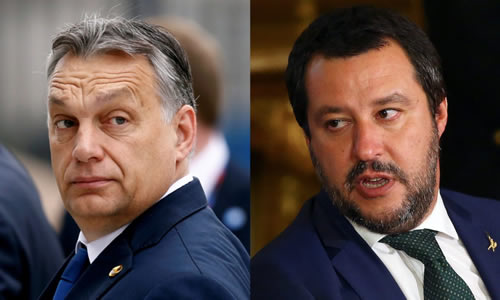
Dear friends,
Matteo Salvini, Italy's new interior minister, has long admired Viktor Orban, an appreciation documented in his tweets since his time in opposition:
"#Hungary has had the courage to rebel against Brussels and now it is developing. Why shouldn't we do this as well?" 3 November 2014
"The Hungarian government blocks entry to immigrants in order to defend its citizens: 'The boat is full'. I wish I was a Hungarian." 24 June 2015
"In Hungary they have a government, in Italy we have slaves." 24 August 2015
"#GOHUNGARY Today a referendum to say no, freely and proudly, no to an invasion. This is democracy, and for this too #Ivoteno" 2 October 2016
"Shame on Europe and on our PD [Democratic Party] who want sanctions against a country with a legitimate government. Long live Hungary!" 26 April 2017
On 4 June 2018 Matteo Salvini told his supporters that he just had a "cordial telephone call" with Viktor Orban where they "agreed to change the rules of this European Union."
Today Orban is still a prominent member of the European People's Party (EPP) and Salvini is the rising star of the European right. Despite the fact that they are not, officially, political allies their ideological kinship extends across all important issues. They agree that a migrant invasion is the most existential threat facing Europe and that "liberal" Christian democrats like Angela Merkel are to blame for it. They accuse Brussels and its elites of treason, attack international NGOs, revile Jean Claude Juncker and his Commission and reject any attempt by European institutions to defend the rule of law in member states. Both were among the first to embrace Donald Trump and both admire the illiberal strength of Vladimir Putin. They have called for "cleaning our cities, street by street" and "mass expulsions" (Salvini) and ethnic engineering to "reverse the Islamisation" of Western cities (Orban). With so little to distinguish their views they are in fact ideological twins: Viktor and Matteo, defenders of a darker, illiberal Europe.
Their convergence also suggests an ominous way in which politics might develop in the coming year, as Europe heads for European Parliament elections in 2019: towards the unification of the far-right and the right, the take-over of the EPP by the likes of Salvini. If this happens, events in June 2018 will have laid the foundation.
"Victory"
On Sunday evening, 10 June, Italy's new interior minister Matteo Salvini changed European politics with a simple tweet. He sent out a photo of himself, arms crossed, standing against a black background. The only text was: "chiudiamoiporti", "we are closing the ports."The image had a simple message: here is a determined man who does what he says and gets what he wants.
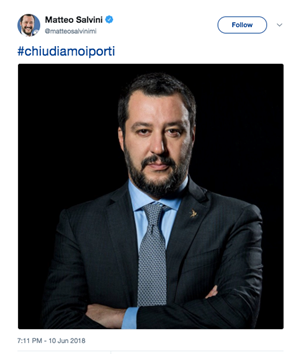
On 9 June the NGO boat Aquarius had taken on board a total of 629 people, rescued in international waters north of Libya. Following the closure of Italy's ports the Spanish government offered on 11 June to accept the Aquarius in Spain. This, too, was first announced in a tweet by Salvini: "VITTORIA" ("Victory"), he gloated. The Hungarian foreign minister called him to congratulate. The Hungarian prime minister, Victor Orban, explained in Budapest:
"When I heard the news, I just let out a sigh and said: 'at last' … Honestly, it was so depressing to listen to people saying, for years, that sea borders cannot be protected, that one lost the will to live. I am sure that what was lacking was not the ability, but the will. The will is back in Italy. This is a great moment."
It is all a matter of will.
This has been the central message on migration of Viktor Orban and other populists for the last three years.
If you want to close a border – sea or land – you can. Just do it.
This argument had worked well for Orban. It is now working for Salvini, who had taken over a party in disarray that won 6 percent of the votes in European elections in 2014 and which stands at 30 percent in the polls in Italy today, following years of focus on irregular migration.
If you want to change Europe, you can.
This has been Salvini's conviction for a long time. In January 2017, at a gathering in Koblenz, Germany, hosted by the German AfD and attended by Marine Le Pen and Geert Wilders, Salvini already promised that "a new Europe is possible":
"Send Merkel, Renzi and Hollande home … And I say: long live the populists, long live the nationalists and long live this gathering! We are probably the first of a new class of leaders."
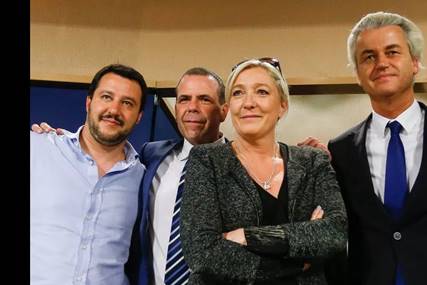
"Another Europe is possible"
Salvini also promised to liberate the people of Europe from the "undeserved authority of the European Union and its elite" and from the "failed, criminal experiment" of the Euro: "the faster we leave the EU the better it will be for everyone."
The rise of a radical
Matteo Salvini has always been a man in a hurry. Born in 1973 to a middle-class family in Milan, Italy's richest and most cosmopolitan city, he joined, at seventeen, a political party whose agenda was to break away from Italy: the Northern League.
In 1993, at the age of twenty, he was elected city councillor for the League in Milan. In 1996, the League declared an independent "Federal Republic of Padania" (after the Latin name for the Po river). In 1997 it held elections for its "Parliament of Padania." Salvini led a communist faction which won five seats out of 210.
Salvini learned how to attract attention. Becoming a regular host on Radio Padania in 1999 provided him with a platform for his talents. In 2000 he declared that during football championships he was always rooting for other teams to defeat Italy. In 2009 he declared at the annual rally of the Northern League in Pontida (Lombardy) that Southern Italians had a lifestyle "too distant from ours in the North": "We have nothing in common. We are light years apart." In 2012 he wrote on Facebook:
"Saying "the North first" [Prima il Nord] is racist? Give me a break, the racists are those who have for decades lived like parasites at somebody else's expense."
Salvini became leader of the Northern League in 2013. He was forty years old. In 2017 he changed the name of the party to "League". Its new slogan became "Italy first"; the bureaucrats he attacked where now in Brussels, and the new "parasites" Roma and immigrants.
Salvini mastered social media. A video clip he shared in late 2017, juxtaposing hungry Italian pensioners and asylum seekers complaining about the quality of food in a reception centre, was viewed by ten million. He acquired more followers on Facebook than any other leader in Europe. In national elections in March 2018 his League won 17 percent of the votes, close to the result of the Democratic Party of Matteo Renzi. On 1 July 2018 the daily Il Giorno showed that he had become the most trusted minister in Italy.
The rise of the League under Matteo Salvini
|
League (%) |
Democratic Party (%) |
|
|
European elections 2014 |
6.2 |
40.8 |
|
Opinion polls – February 2018 |
14.3 |
22.8 |
|
Italian national elections – March 2018 |
17.4 |
18.7 |
|
Opinion polls – April 2018 |
21.7 |
17.7 |
|
Opinion polls – May 2018 |
23.6 |
17.9 |
|
Opinion polls – June 2018 |
28.8 |
185 |
|
Opinion polls – July 2018 |
29.7 |
17.8 |
Standing ovations
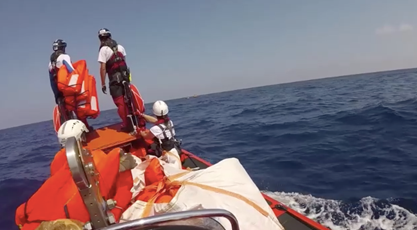
One of the Aquarius RHIB with medical and rescue staff
To understand Salvini's meteoric rise requires appreciating his major talent: telling stories. Stories like the one he told members of the newly elected Italian Senate on 13 June 2018, three days after blocking the Aquarius from Italian ports, when in his maiden speech he received standing ovations from 80 percent of the members of the house.
Salvini presented NGO rescue boats like the Aquarius as tools of a sinister conspiracy against the Italian people:
"It is not possible that some private NGOs paid by nobody-knows-whom decide the speed and times of immigration. I love every kind of generosity and voluntarism, I am a blood and organs donor myself, but when I read that behind certain initiatives there is the Open Society Foundation of George Soros, I start having doubts about how spontaneous this kind of generosity is."
By contrast, Italians were people of love and compassion: "in terms of generosity, kindness and solidarity Italians have nothing to learn from anyone else." As an Italian and a father, he was "sick and tired of children dying in the Mediterranean because somebody is deceiving them." He promised:
"My aim is to save lives and to make sure that these children grow up in the best possible manner, without having to flee their villages and cities to get onto rubber dinghies, which human traffickers let depart already half deflated, knowing that somebody will come and save these unfortunates."
He boasted that Italy "has never been listened to as much as now." He made fun of France, which had been critical of his policy, to sustained applause:
"France is telling us we are cynical, but I would like to point out that from 1 January to 31 May, France pushed back 10,249 human beings, including women, children and disabled people [from the French-Italian border]. Based on the relocation agreements of 2015, France committed to take 9,816 migrants [from Italy], but only took 640. I ask President Macron to take the remaining 9,000 starting tomorrow morning, to give a clear signal of solidarity, not just in words."
He also mocked Spain and its gesture of welcoming the Aquarius in Valencia:
"I thank our Spanish friends, reminding them of the numbers, according to which Italy is hosting 170,000 migrants in its reception structures and Spain is only hosting 16,000. 16,000 against 170,000! I thank the good heart of President Sanchez, who now has the possibility to do even more to show his solidarity and openness, in the upcoming weeks, in light of these numbers from which we are starting."
Salvini closed by quoting the Bible: "Love your neighbour like yourself."
"My neighbours are those women and children escaping from war, who are the first victims of the chaos we live in. Those few teenagers, women and children should feel at home in our homes, but they must not be mixed up with illegal immigration that only brings social clashes. However, 'Love your neighbour like yourself' also means loving the millions of Italians who lost their homes, jobs and hope.
Therefore, with all my own limitations and flaws, I will do everything that is humanly possible to give a voice to real refugees, to regular immigrants, who come here to build their and their childrens' future, respecting our history, our culture and our traditions. But most of all I will do everything in my power so that those Italians who have lost hope will regain it."
The next day the daily La Stampa concluded that Salvini had "conquered the Senate with his eloquence" and had spoken "as if he were the real prime minister of Italy." He had told a great tale about the good, the bad and the ugly, Italian generosity and foreign hypocrisy.
What Salvini achieved – 564 dead in June
And yet, Salvini never explained that during its rescue effort in June the Aquarius had at all times followed the instructions of the Maritime Rescue Coordination Centre (MRCC) in Rome and that of the 629 people it took on board 400 had been saved already by Italian boats and were transferred from three Italian coast guard ships and a commercial vessel to Aquarius. Nor did he refer to the fact that the other 229 people who the Aquarius saved itself, upon request of the MRCC in Rome, would most likely have drowned otherwise.
So what did Salvini achieve in June? He claimed, more than once in his tweets, that he had achieved in a few days more than all previous governments had in seven years. In fact, in his first month as minister he had NOT actually reduced the numbers of arrivals. They had already fallen in the five months before to less than 2,700 people a month on average. In fact, fewer people arrived in Italy to claim asylum in the first five months of 2018 than in Germany, France or Greece!
In June 2018 the total number of people arriving in Italy across the sea was 3,136. This is not counting the people the Aquarius took to Spain (629) and another rescue boat took to Malta (224).
On the other hand, one immediate impact of Salvini's policies was a dramatic increase in the absolute number of deaths. No June in the previous decade had been as deadly as June 2018 in the Central Mediterranean. The monthly average of people drowning in the ten months before Salvini became interior minister had been 100. In June 2018 it was 564.
Italy: twelve months of deaths and arrivals
| Month |
Deaths |
Arrivals |
|
August 2017 |
143 |
3,914 |
|
September |
102 |
6,291 |
|
October |
167 |
5,979 |
|
November |
193 |
5,645 |
|
December |
9 |
2,327 |
|
January 2018 |
215 |
4,189 |
|
February |
121 |
1,058 |
|
March |
23 |
1,049 |
|
April |
20 |
3,171 |
|
May |
11 |
3,963 |
|
June |
564 |
3,136 |
|
July |
157 |
1,944 |
In fact, Salvini's policy appears intent to want to undermine all rescue efforts, by anyone: blocking any boat that rescues migrants, whether a US Navy ship, military vessels that are part of EU Operation Sophia, Danish cargo ships and even Italian military and coast guard vessels.
The steps taken by Rome in June showed a willingness to risk more deaths at sea in order to make a political point. It is a policy of Italy First – at the expense of migrant lives, rescuers and other European countries. And yet, politically, it worked wonders for Salvini.
"Nessun dorma!" – Salvini, Orban and 2019
Other than the increase in the number of deaths June 2018 also saw another ominous development: the emergence of a new axis in European politics, around the project of a pan-European campaign against migration and refugees to transform European politics in 2019.
Salvini, basking in his rising popularity and his success in closing Italy's borders, made his ambitions clear on 1 July at the annual League rally in Pontida. An opera star warmed up a crowd of 75,000 with "Nessun dorma" (No one sleeps), the aria which ends with "At daybreak, I will win!" Then Salvini, on stage, promised the crowd certain victories. He spoke about love and honour, inviting his followers to "turn away from hate and jealousy, leaving such feelings to others." He announced that the European elections of 2019 would be a "referendum between the people and the elites". He promised that his League, which had gone from changing regions to changing Italy, was now going "to change Europe." This required a League of Leagues, a pan-European alliance of "free and sovereign movements that want to defend their people:"
"The next wall that will fall, after the Berlin wall, will be the Brussels wall, to give back the right to work, to life, health and security to all Europeans. This is the other battle."
Salvini then held up a rosary and announced, looking at the sky:
"We will win this battle if HE will protect us from above … Do you swear that you will not give up this battle until we will have liberated the people from this Europe?"
His audience roared. It was the roar of a wave of support, which other European politicians better take seriously; a wave which Viktor Orban, Salvini's inspiration, had long been riding
Like Salvini, Orban also advertised his strategy on how to capture power at the June 2019 European elections. Like Salvini, Orban also defined migration as the central issue. Like Salvini, Orban agreed with the approach of US president Donald Trump, who called Orban on 16 June to congratulate him on his migration policy. That same day Orban spoke at a conference in Budapest. He could not have been clearer:
"Can there be compromise in the migrant debate? No – and there is no need for it. There are those who imagine that each opposing side should make concessions … This is a bad approach. There are questions on which there will never be agreement."
Like Salvini, Orban likened the EU in Brussels to the former Soviet centre in Moscow and blamed Commission president Juncker in particular:
"Three grave errors weigh upon the conscience of Brussels: firstly, we have lost the United Kingdom; secondly, we have been unable to defend our continent against migrants; and thirdly, Brussels has upset the balance between East and West. The responsibility of the current European leadership is as clear as day … In 2019 this must be brought to an end."
Orban then warned the establishment, including in his own political group, the EPP:
"In relation to the 2019 elections to the European Parliament, it would be easy to, say, establish a new formation from like-minded Central European parties – or, indeed, a pan-European anti-immigration formation. There is no doubt that we would have great success in the 2019 European elections."
Like Salvini, Orban, in an interview on Hungarian radio on 22 June, saw two camps in Europe: the Visegrad Four, Italy and Austria make up one; Germany and Nordic countries another:
"Regarding migration in Europe, there are now three major issues on the agenda. The first is whether or not we will protect our borders. Surprising though it may be, on this there are two opposing views: there are some who believe that borders need not be protected; while others take the view that they must be protected. Some believe that borders are ugly and bad. Meanwhile others say that a border is like an eggshell: an egg without a shell will be fried and eaten.
The second question on the agenda is what we should do with those who have already poured into Europe. One side says that we should welcome them, while the other says that we should swiftly take them back home … There is a third issue: who we should let into Europe in the future. We say that we won't let anyone in."
On 28 July Orban presented his challenge at a Summer University in Romania. European civilisation itself faced a grave risk. The main reason was the Juncker Commission, the current European Parliament (in which the EPP is the biggest group) and a European elite whose "days are numbered":
"The gravity of the situation – the gravity of the situation of European civilisation – has been revealed by the migrant crisis. Let me take a complex thought and simplify it: we must face up to the fact that Europe's leaders are inadequate, and that they've been unable to defend Europe against immigration. The European elite has failed, and the European Commission is the symbol of that failure."
Orban saw a looming battle between true Christian democrats, who are nationalists and by definition illiberal, and those who believed in a nihilist "open society":
"In today's open-society Europe there are no borders; European people can be readily replaced with immigrants; the family has been transformed into an optional, fluid form of cohabitation; the nation, national identity and national pride are seen as negative and obsolete notions; and the state no longer guarantees security in Europe."
Orban warned of a trap:
"The bait for this trap is hanging right in front of our noses: it is the claim that Christian democracy can also, in fact, be liberal … if we accept this argument, then the battle, the struggle we have fought so far will lose its meaning, and we will have toiled in vain. Let us confidently declare that Christian democracy is not liberal …
Christian democracy gives priority to Christian culture; this is an illiberal concept. Liberal democracy is pro-immigration, while Christian democracy is anti-immigration; this is again a genuinely illiberal concept."
This indicated just how little respect he had left for Christian Democrats like Angela Merkel, who, on her visit to Budapest in February 2015 had explained, standing next to Orban, that she did not believe the concept of "illiberal democracy" made any sense.
Finally, like Salvini, Orban made an appeal:
"I suggest to all of us, Dear Friends, that we concentrate all our efforts on the 2019 European Parliament elections … The time has indeed come for the European elections to be about a great, important, common European issue: the issue of immigration, and the future related to it … Today we believe that we are Europe's future."
It is this confidence he already expressed in his State of the Nation speech in Budapest in February 2018. And like Salvini, he sees similar allies for this project:
"We now stand on the brink of victory. The countries of the Visegrad Four are unwavering. The Orthodox world stands firm, and it seems that Croatia has come to its senses. Austria has now turned in the direction of patriotism and Christianity. In Bavaria a spiritual and political resistance has developed under the leadership of the CSU. Perhaps it is not too late. And we await, we keenly anticipate, the result of the Italian election, and with it the turning-point which will see the return to government of common sense, Italian national and cultural identity."
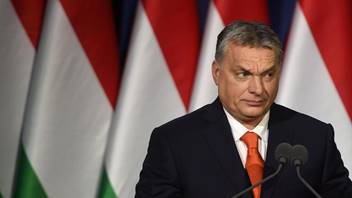
ESI Paper
Rhetorical poison and a vision of hell
Viktor Orban in February 2018
Responding to Salvini: a Sanchez plan?
In the past two years ESI has made many concrete proposals for an alternative policy to both the status quo of arrivals and mass drownings and to the Orban strategy of abolishing the right to asylum and institutionalise push-backs. Today anybody who cares about human rights urgently needs an answer how best to respond to the campaign against rescuing people at sea; and to convince majorities of the public that it is possible to combine empathy and respect for the right to asylum with policies that reduce irregular migration.
In early 2017 we presented our proposal as a Malta Plan. This evolved into a Rome Plan, which we discussed with the previous Italian government and senior officials in Rome. We explored aspects of it in more detail in our "Amsterdam in the Mediterranean" proposal, which helped direct attention to the Dutch experience of combining fast and quality asylum procedures and appeals. We teamed up with Gesine Schwan in Germany to present a joint Knaus-Schwan proposal for a voluntary European relocation fund.
Two weeks ago we argued in a long interview in Die Welt that, given developments in Italy and rising numbers of arrivals in Spain, the EU as a whole would benefit from a coalition of member states embracing a Sanchez Plan as a successful alternative to Salvini's policies.
In an interview last week Spanish foreign minister Josep Borrell expressed many similar ideas. For more recent endorsements see below – for the full reaction in the media go here.
And yet, for the moment it seems as if Salvini and Orban have the wind in their sails. Will the leaders of Spain and France, Germany, Greece and others representing countries and societies unwilling to hand over asylum policy to Matteo Salvini and Viktor Orban, act in time? Can Christian Democrats, liberals, progressives and indeed all those who believe in a European Union defined by human rights find a way to protect its foundations? Can the EPP define clearly how its policies are different from those of Salvini and the European far-right?
Salvini and Orban have stated clearly what they want. It remains to be seen if there is a credible response to their challenge.
Many best regards,

Gerald Knaus
PS: the PDF version has footnotes and sources
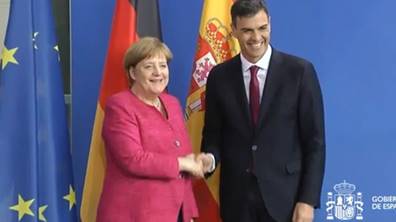
ESI Sanchez Plan (July 2018)
There needs to be a strong joint commitment to sea rescues.It is unacceptable to let people drown who might be saved with more effort. In June 2018 – the first month with Italian Interior Minister Matteo Salvini –more people drowned in the central Mediterranean than in any June in the past decade!
While it is crucial to send more rescue boats, this is not in itself enough to reduce deaths. The deadliest six-month period in the Mediterranean was actually the period May-October 2014, when Italy was fully engaged in its ambitious rescue mission (Mare Nostrum): more than 3,000 people died on the way to Italy. (The deadliest full year was 2016, the year when most rescues took place).
Spain, France, Germany and others should provide more rescue boats outside the Libyan territorial waters. The objective must be to ensure that nobody drowns; while arrivals are reduced without push-backs.There are three possible ways to achieve this:The first option is by far the best. It represents a real humane alternative to Salvini's current approach. It combines control and empathy, sea rescues and returns.Can a strategy based on this first option be implemented? Yes, it can.discourage people who have no need of protection from coming, by sending a clear message that those who do not need international protection will be returned to their countries of origin quickly, following a fair but fast asylum procedure.
work with transit states that stop boats leaving (as Spain did with Senegal in 2006 and with Morocco for a longer period; as Italy and the EU have done, much more problematically, with the Libyan coast guard since early 2017; or as the EU and some members have done working with Niger to stop smugglers taking people through the Sahara).
send back people who are rescued to North Africa, or to some "processing platforms", as Matteo Salvini, Viktor Orban and Sebastian Kurz have long advocated as "Australian solution", modelled on Nauru; an option the last EU council requested should be studied. This is both highly problematic legally and completely impractical. When some European leaders present such platforms as their proposal what they really appear to want is a thin cover for push-backs to Africa.
It would require three concrete measures:
1. European RICs – registration and identification centres, what the European Council called "controlled centres" (the term hotspot, discredited by the awful conditions on the Greek island, should be dropped): i.e. humane, decent accommodation centres, set up in European Mediterranean countries of arrival, jointly funded, perhaps even jointly run, as concrete expressions of solidarity. The opposite of the current Greek hotspots in crucial aspects:
Set up an immediate coordination board of senior officials from reception and asylum services of European countries that want to make this possible: the Dutch, French, Germans, Benelux, Portugal, Nordics, but also inviting Swiss and Norwegians, both members of Schengen and Dublin. Create a small secretariat to set out realistically the human resources needed for this (perhaps based in Madrid.) Appoint a credible coordinator with administrative experience to ensure that resources arrive in time. Learn from Greek islands experience: outsourcing this to EASO, under current procedures, is not going to work, as can be seen in Lesbos or Chios.Ensuring sufficient space and decent treatment of everyone (modelled on the Dutch Ter Apel asylum centre; or European "Ankerzentren", as agreed in the German coalition agreement), these should set a model how a coalition of European countries respects human dignity. There should be full transparency.
A time limit: nobody will be kept in a RIC longer then 2 months at most. The goal is to ensure that a first asylum procedure and an appeal are possible within 6 weeks for most cases.
If France would offer to host such a centre in Corsica (for people rescued in the central Mediterranean), if Malta would as well, it would be even better. Then such RICs should replace the current hotspots in Greece – to help accelerate asylum procedures, increase returns from the islands to Turkey (which currently stand at only 25 a month!) and to relieve the humanitarian crisis on the islands.
2. Immediate outreach to key African countries of origin for LARS (Legal Access and Return statements). Appoint a joint team (one Spanish, French, German) to go to West African countries first to offer simple and transparent statements. These statements should include:
Start negotiations with some African countries now (Senegal, Ivory Coast!) It is vital that other countries in Africa see this as attractive and want similar arrangements.Commitment from a coalition of willing EU member states to annual contingents of legal migration and scholarships to these EU countries in the next five years.
Commitment from African partners to take back everyone who crosses the Mediterranean after a day X and does not apply for or does not receive asylum in the EU. The goal is that the announcement itself sharply reduces arrivals.
3. Commitment by European members of this coalition of concerned countries to quickly relocate those who get protection in these RICS, so there is no special burden for Spain – relocating recognised refugees, not asylum seekers.
Further reading
- ESI proposals for the refugee crises in the Central Mediterranean and the Aegean: www.esiweb.org/refugees
- Media reactions to ESI refugee proposals
Some recent endorsements of ESI's proposal (many in German)
- Süddeutsche Zeitung, Stefan Ulrich, "Das Dublin-System kann weg" ("Time to scrap the Dublin system") (13 August 2018)
- Focus, Malte Arnsperger, "Kanaren-Krise aus 2006 zeigt: Europa kann Leben retten und Flüchtlingszahlen senken" ("The Canaries crisis of 2006 shows that Europe can save lives and reduce refugee numbers") (9 August 2018)
- Frankfurter Rundschau, Frank Schwabe and Gabriela Heinrich, "Koalition der Realisten" ("A coalition of realists") (8 August 2018)
- Deutsche Welle, "DW News" - interview in German on family reunification and anchor centres - (1 August 2018)
- BNR, "Sleutel voor oplossing europees migratievraagstuk ligt in Ter Apel" ("The key to solving the European migration problem lies in Ter Apel") (1 August 2018)
- Kronen Zeitung, Christian Hauenstein, "Wer in ein Boot steigt …" ("Getting on a boat …") (1 August 2018)
- Tagesspiegel, Andrea Dernbach, "Gerald Knaus denkt für die EU vor – wieder einmal" ("Gerald Knaus is thinking ahead for the EU – again") (30 July 2018)
- Tagesspiegel, Ruprecht Polenz, "Wie eine humane und realistische EU-Migrationspolitik aussehen kann" ("How a humane and realistic EU migration policy could look like") (10 July 2018)
- Die Zeit, Andrea Böhm, "EU-Asylpolitik: Europas Flucht vor der Realität" ("EU asylum policy: Europe's flight from reality") (6 July 2018)
- Huffington Post, "'Markus Lanz': Asyl-Experte erklärt, welche Probleme gerade alle übersehen" ("'Markus Lanz': Asylum expert explains which problems are overlooked by everybody") (5 July 2018)
- ZDF, "Markus Lanz" - Gerald Knaus in German TV debate - (4 July 2018)
- Der Spiegel, Fiona Ehlers, "Was Deutschland vom niederländischen 'Ankerzentrum' lernen kann" ("What Germany can learn for the Dutch 'Anchor Centre'") (29 June 2018)
- Süddeutsche Zeitung, Michael Steiner, "Die eigentliche Aufgabe" ("The real task") (28 June 2018)
- Der Spiegel, Gesine Schwan und Gerald Knaus, "Neue EU-Flüchtlingspolitik - Kontrolle und Empathie" ("New EU Refugee Policy - Control and Empathy") (28 June 2018)
- ZDF, "Markus Lanz" - Gerald Knaus in German talk show on migration - (8 May 2018)
- Süddeutsche Zeitung, Thomas Kirchner, "Freiwillige vor" ("Any volunteers?") (19 April 2018)
- Der Spiegel, Mirco Keilberth, Peter Müller and Maximilian Popp, "Why Europe's Migrant Strategy Is an Illusion" (6 September 2017)
- Merkur, Sebastian Horsch, "Kommentar: Libyen ist der falsche Partner" ("Comment: Libya is the wrong partner") (13 July 2017)
- Die Zeit, Mariam Lau, "Moralische Panik" ("Moral panic") (13 July 2017)
- Süddeutsche Zeitung, Thomas Kirchner, "Libyen zum Bollwerk gegen Flüchtlinge zu machen, ist moralisch falsch" ("Making Libya a bulwark against refugees is morally wrong") (9 July 2017)
- Frankfurter Allgemeine Zeitung, Ralph Bollmann, "Die große Angst vor Afrika" ("The great fear of Africa") (4 July 2017)
